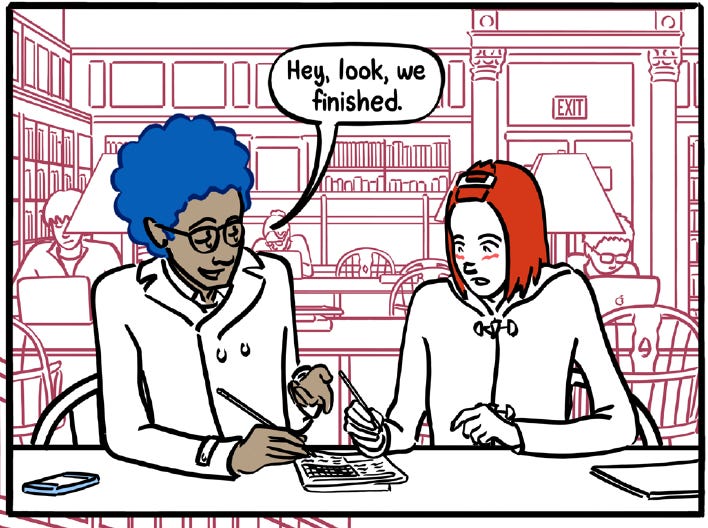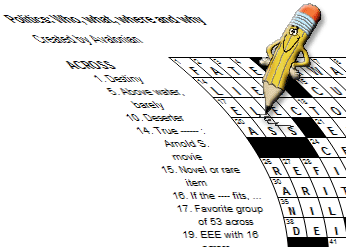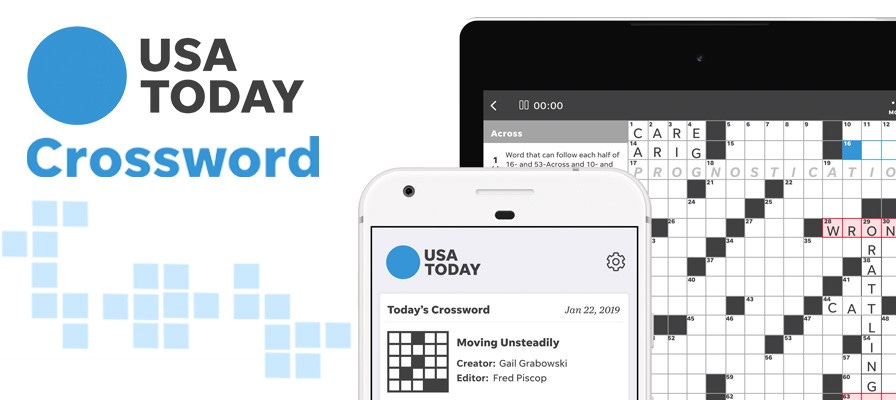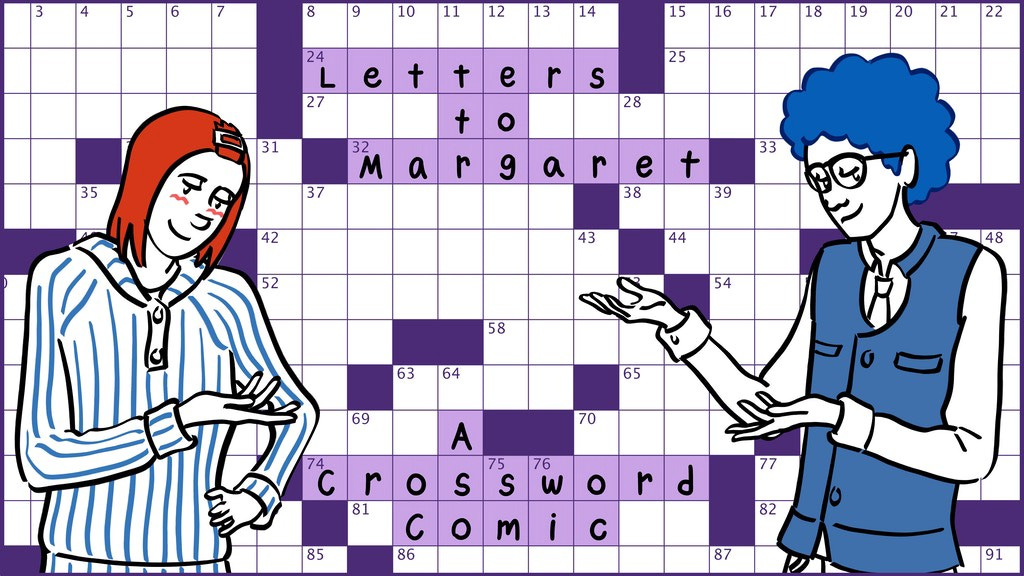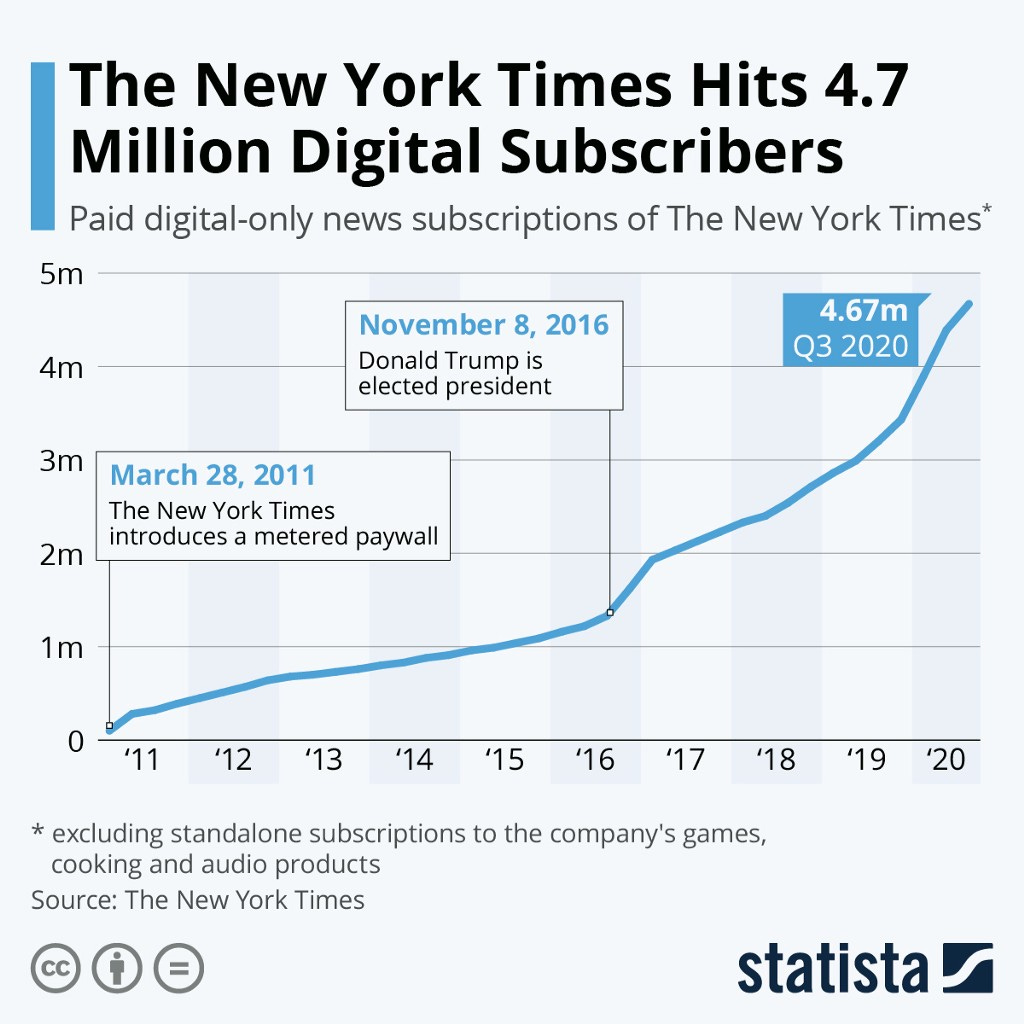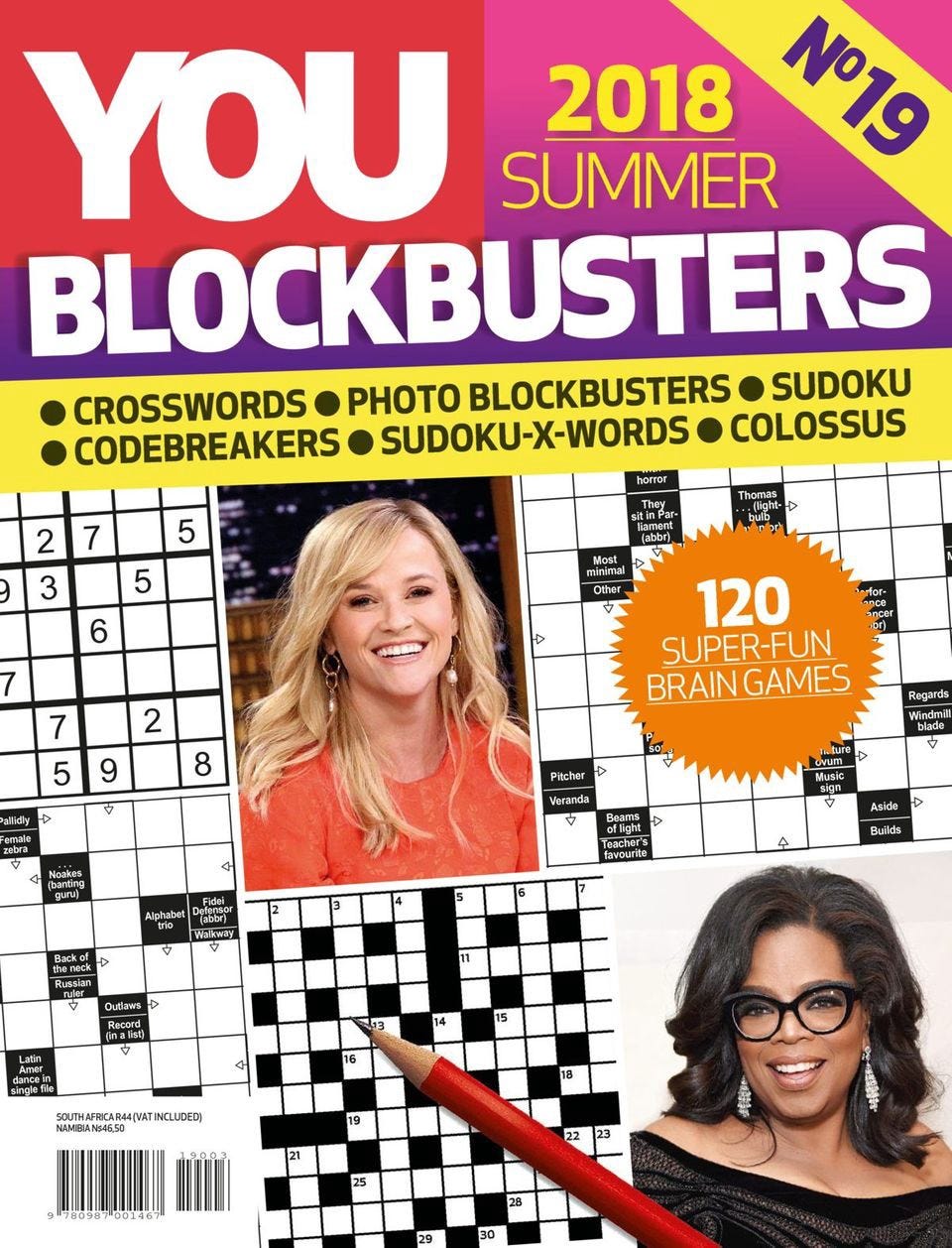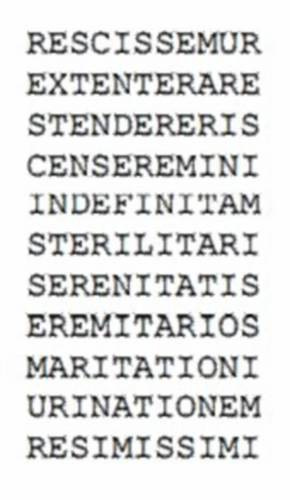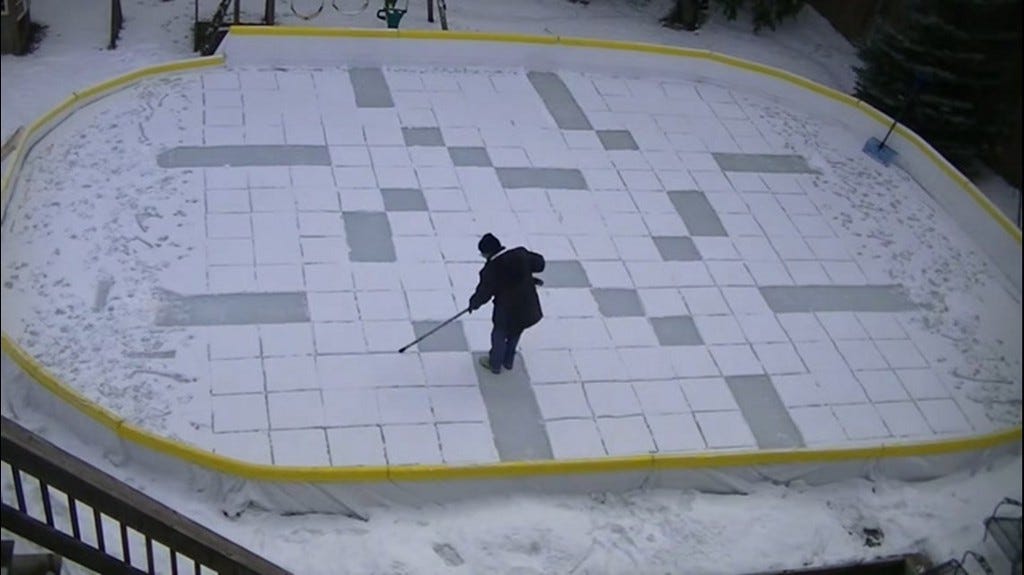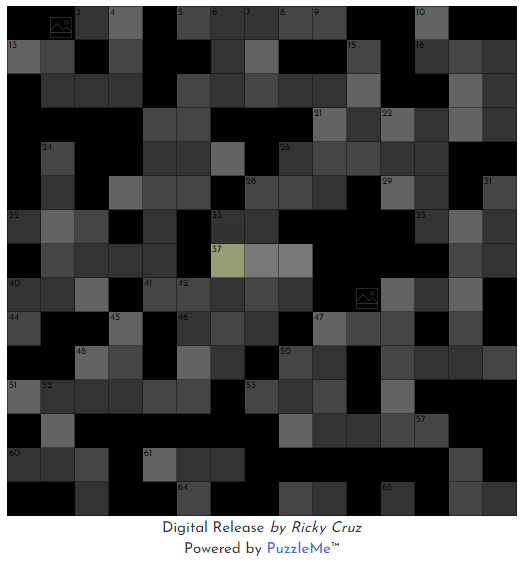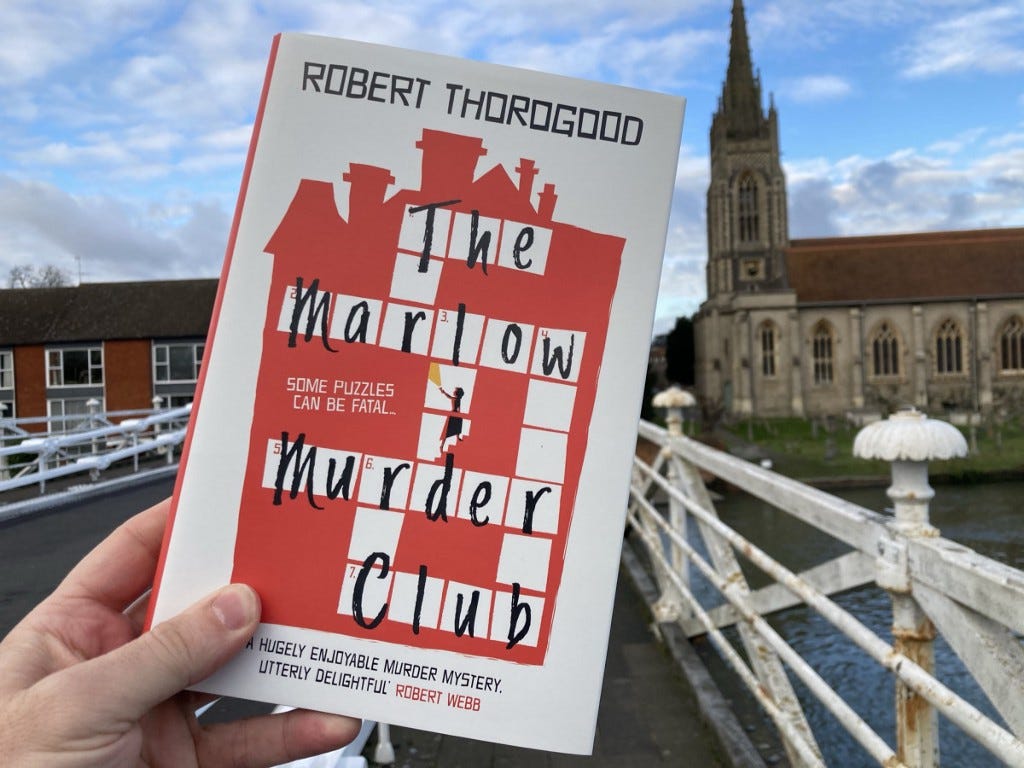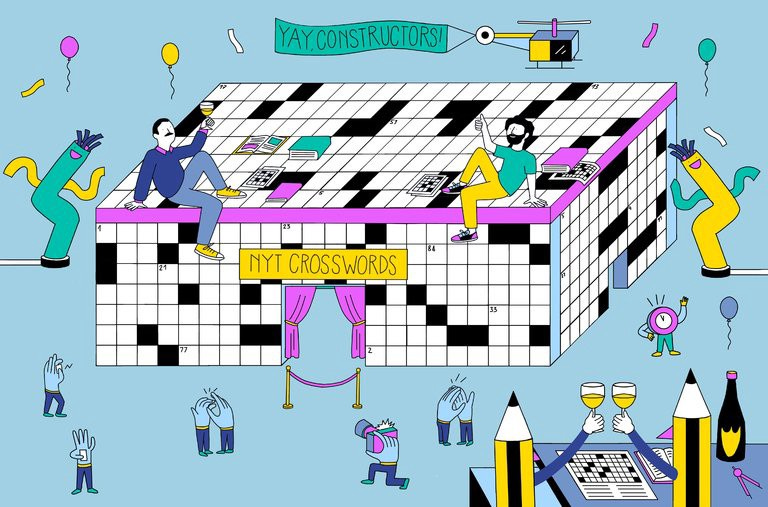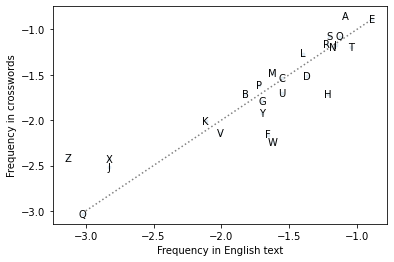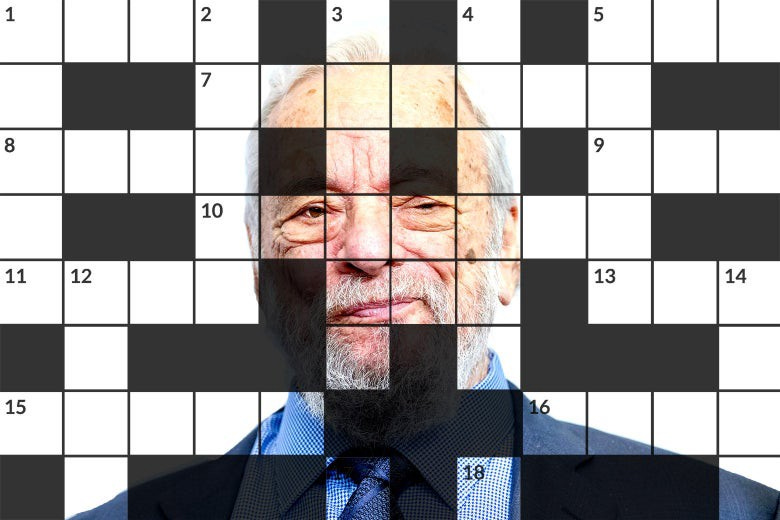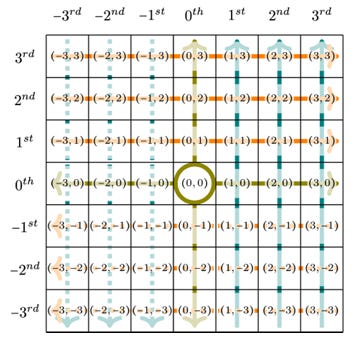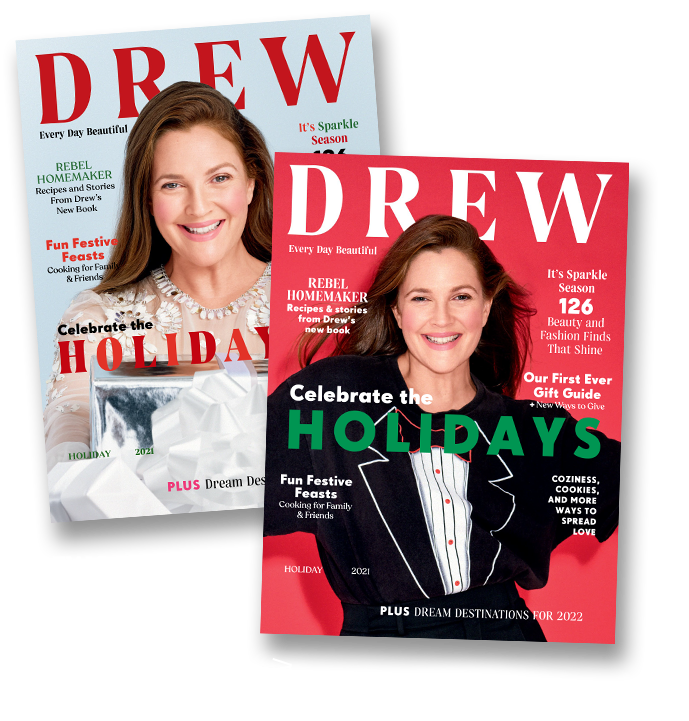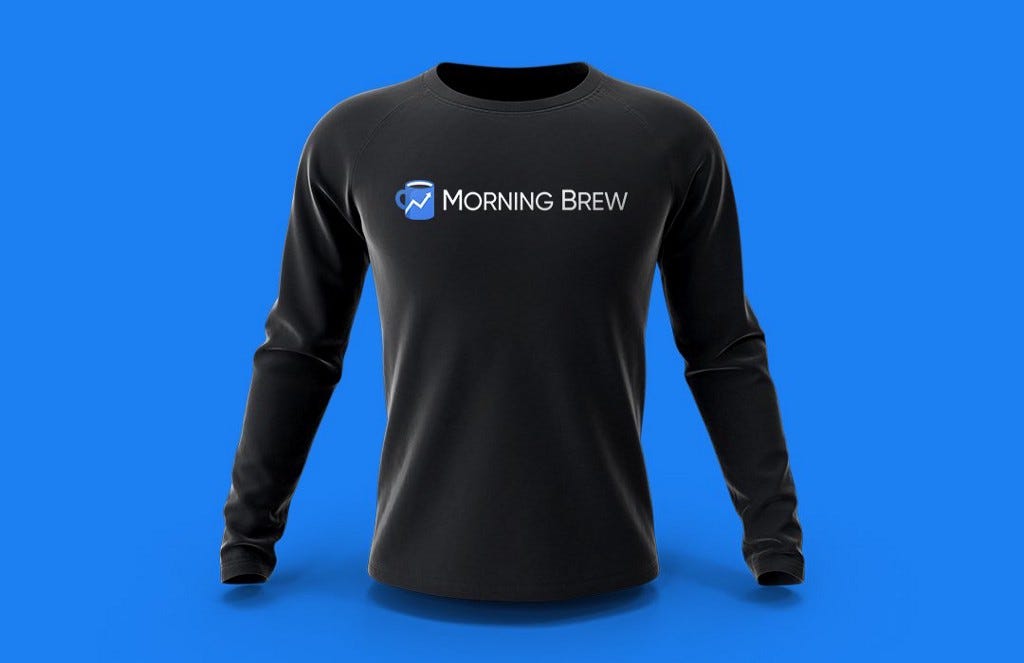The Year in Crosswords, 2021
2020 was quite a year for puzzles. At times, I was like, “There’s no WAY next year could be as crazy as this one!” And as it turned out…I was right.
In 2021, controversies mostly simmered rather than flaring up, the puzzle world expanded at a measured pace, and interest shifted somewhat from what was in the puzzles to how they were discussed and presented. But there was still a lot going on, and perhaps some slowdown was inevitable. After all, we were a bit less in need of diversion: post-January politics were somewhat saner, and we began to get the novel coronavirus under contr —
[touches finger to earpiece] Sorry? What was that? 300,000 whats per what?
Before we tuck into it all, the usual caveats: I am just one guy assembling these links, magpie-like, in my spare time. Suggestions of things I’ve missed are welcome, and I’ll fold them into the main text where I can.
Also, I’ll be bringing some long-simmering projects to a boil in 2022. Most of them relate to my two great creative loves — comics and crosswords. To keep up with all that, may I suggest subscribing to my brand-new newsletter? And now, back to the show…
Technical Difficulties
Last year’s (and arguably last decade’s) cultural controversies had led to changes in the New York Times puzzle staff by 2020’s end. One might expect the new team to wade into some new debate, drawing fire for being “too woke,” “not woke enough,” or both. But the section’s biggest move involved not content but technology.
Rachel Maddow MSNBC on Twitter: "first day back from vacation! 😀last day of the NYT crossword on across lite 😱 / Twitter"
first day back from vacation! 😀last day of the NYT crossword on across lite 😱
Ending twenty-five years of collaboration with outside software developers, the NYT abandoned all support for third-party apps such as Across Lite and Puzzazz. No longer would it offer its puzzles to subscribers in .puz or any downloadable format. Macintosh solvers could still use Black Ink to solve the NYT after the changeover, but there’s no guarantee that situation will continue. (Puzzazz is, at this writing, still trying to negotiate a new arrangement.)
This affected not only new releases but also all prior NYT puzzles edited by Will Shortz, shortly after the number of those puzzles passed the 10,000 mark. An enormous database was gone, virtually overnight.
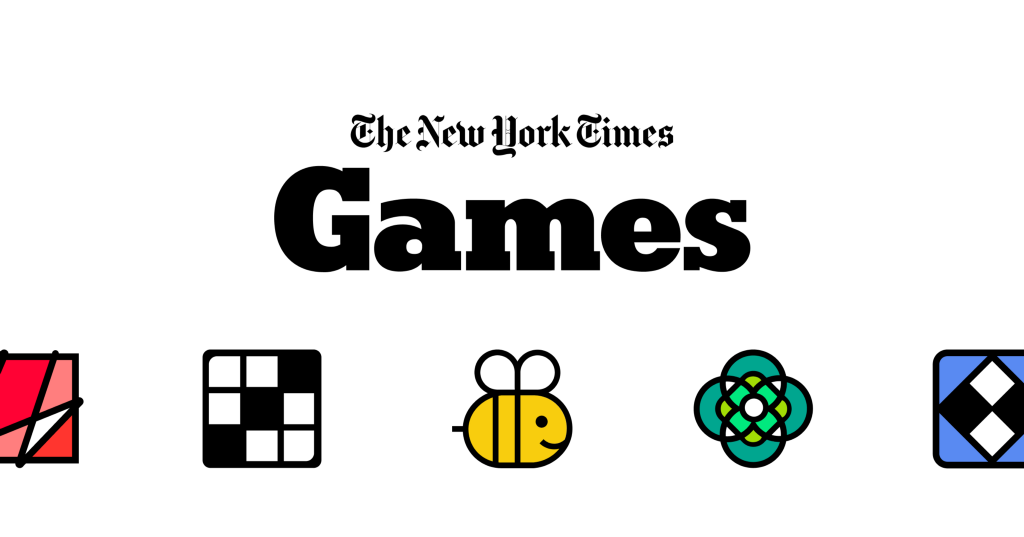
The shift from Android-style openness to Apple-style walled garden alienated many solvers, especially those who had reason to solve offline. It also made puzzleheads a lot more dependent on keeping their subscriptions active. Economy-minded solvers in 2020 could subscribe for a couple of weeks, download all the puzzles they wanted, and then cancel their subscription until they ran out. Not an option in late 2021!
But this story isn’t as simple as “big company squeezes its customers.” NYT Games editor Everdeen Mason, who took responsibility for the decision, pointed out that being beholden to outside computer programs limited the
NYT’s ability to experiment with the puzzle. As Jim Horne added, that was extra true with Across Lite, which had not been keeping up with other displays, graphically or otherwise. Over the years, many of the NYT’s creative puzzles have had to add a “solve in some other format” note.
Literate Software did release an update to Across Lite shortly before the NYT cut third-party apps loose. But by then, the wheels were already in motion, and the update felt like too little, too late. Nor did it address Mason’s point: the NYT can only pull new formatting tricks if it can control how the puzzle’s presented… and it can’t expect outside developers to anticipate those tricks.
Roy Leban’s Puzzazz hopes to be an exception. Puzzazz is perhaps the most adaptable outside program, capable of rendering artwork, hand-drawn grid and clues, and other types of puzzles the NYT only does in print and PDF. At this writing, Leban informs me, Puzzazz is still hoping to renew its relationship with the NYT, though it received no direct compensation from running NYT puzzles in the past.
In the end, it’s not that remarkable that the NYT would want to exert more control over its profitable entertainment division. What’s remarkable is that it took this long to do it.
To mitigate the transition, the NYT published a how-to guide for its large print, ink saver, and left-handed features. It wasn’t long after the announcement that USA Today relaunched, and started charging for, its own crossword app.
Other indie programs had a better year. Matt Ginsberg’s crossword-solving AI, Dr. Fill, won its first American Crossword Puzzle Tournament. This was partly due to the ACPT being virtual this year, meaning the “doctor” could run on a much larger, faster machine than Ginsberg’s laptop. But it also resulted from combining Ginsberg’s “classic” approach to AI with newer research at Berkeley. WIRED and Science Friday have further analysis.
And if that’s not enough to make you insecure, Chase Roberts has built a robot who can beat you at Wordscapes, too.
Content and Discontent
The debate over technologies used didn’t completely overshadow the ongoing cultural conversation around crosswords. For one thing, that conversation was a centerpiece of Letters to Margaret, a romance graphic novel by Hayley Gold (with narratively linked puzzles by Andy Kravis and Mike Selinker).
By turns exaggerated and sympathetic, Gold’s young protagonists fence over fill as they fall for each other. And if that’s not crossnerdy enough for you, the title invokes Margaret Farrar, the first NYT puzzle editor, whose “voice” has her own role to play as the story unfolds. Backers received the digital version of the comic already, and the print version is reportedly shipping at this writing.
David Steinberg solicited and published a month of crosswords from LGBTQ+-identifying constructors at Universal, starting up the hashtag UniversalXwordPride. Amanda Rafkin helped edit the contributors, many of whom were not new to Universal, before emerging as a solo editor. As Rebecca Goldstein put it: “LGBTQ+ people have been making your puzzles all along. No reason not to celebrate it.”
It’s not just who constructs, it’s who decides what is common knowledge (and sometimes what simply should be). The NYT did a “Black constructors week” including a puzzle by USA Today editor Erik Agard (February 5). Puzzle critic Rex Parker called this “the Blackest puzzle not only of this week, but possibly of all time. There’s not a single human being in the clues or fill who isn’t Black. Well, most of the 2019 NATS weren’t Black, just as most sherpas aren’t, but every specific person mentioned in this puzzle is.”
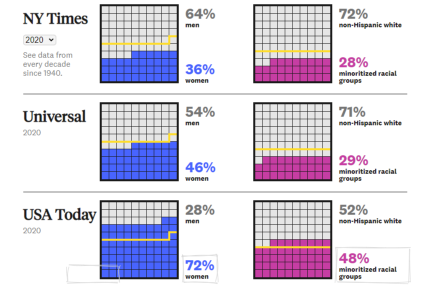
This is in some ways a logical extension of the minority representation USA Today has already been advancing. Under Agard, it’s become known for representing traditionally underrepresented groups. The argument against such representation is often “what the average solver knows,” but PuzzleNation responds, “Just who is the average solver, anyway?”
As the week wound up, Agard and Kameron Austin Collins took the opportunity to call out critical practices at XWordInfo, a resource that reviews the NYT puzzles but also provides data on them, for marginalizing what nonwhite content does make it into the NYT (click the “notes” section to see constructor comments). Camila Valle and Natan Last had an illuminating discussion of “decolonizing the puzzle” which also touched on some issues of compensation.
It’s not just who constructs. But sometimes, it’s who constructs…and the opportunities puzzlemaking presents for those who might otherwise have lived poorer lives. This includes not only well-recognized minorities, but also those with marginalizing conditions. Washington Post crossword editor Evan Birnholz discussed his social communication disorder and overcoming it to become a crossword constructor and editor. New Yorker crossword editor Anna Shectman discussed her eating disorder and how constructing and editing helped her survive it. Ross Trudeau and his girlfriend used making crosswords to manage his chronic pain.
Other Business Moves
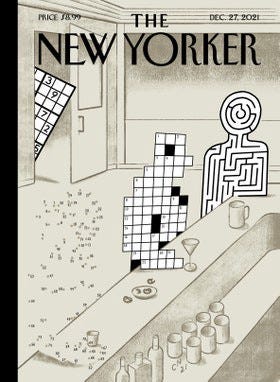
The New Yorker put crosswords more regularly in its print version, supplementing its online offerings, and published an entire “Cartoons and Puzzles” issue. Inside Hook’s response, “Are Crossword Puzzles the Key to Saving Print Media?,” posits that print solves offer experiences the screen can’t replicate. While that’s technically true, believing that’s enough to save print media on its own seems like an optimistic overreaction. It’s not like the online version of the New Yorker puzzle has gone anywhere.
And in fact, the NY is expanding its online puzzle offerings, too, including some all-new cryptic crosswords. (Thanks to Amy Reynaldo for pointing out a cool feature to those cryptics: when the puzzle is finished, the clues expand to explain how the answers are derived.)
Everdeen Mason, the NYT Games editor mentioned above, also introduced a “vibe check” to the puzzle-vetting process. Demand for a slot in the prestigious feature continued to rise, forcing the team to pause submissions for a month and change, an embargo set to end on January 4.
NYT subscriber numbers, with the puzzle as a partial driver, reached new heights in 2020 but against a backdrop of flat revenue and advertising declines. (Numbers for 2021 are not yet available.) Rick Edmonds notes that the NYT Games subscriber-count is approaching a million.
South Africa joined the digital crosswording space with YOU Crosswords. Marking the occasion, a history of the YOU magazine crossword.
Moves in crowdfunding: The American Values Club Crossword Kickstarted a major expansion, offering four to five times as much content as before. Matt Gaffney’s popular weekly meta exploded onto Patreon (subscribe here). Out of Left Field has a new book out, Word Salad, a guide to cryptics. Peter Gordon continued his series of petite pangrams and topical “Newsflash” puzzles. And in response to recent judiciary moves, These Puzzles Fund Abortion.
Brooke Husic became the Inkubator’s managing editor.
In response to sharp allegations from ex-employees of abusive management practices, Mike Selinker of Lone Shark Games has left the public eye with the stated goal of working on himself.
New Crossword Series
I mentioned 7xwords last year, but it’s now finishing its year-long run, so it deserves a repeat. Spearheaded by Malaika Handa, it offers a great collection of 7x7 puzzles in basically every possible grid combo, which took 312 updates, a year of six-day weeks, to complete (interviews here and here).
Other features that launched in 2021: The Browser’s weekly cryptic, Crucinova, Crosswords from Outer Space, Crosswords Schmosswords, Just Gridding!, A Crossword Rose, Odd Bear Puzzles, Luckystreak Xwords (Patreon) and The Juggernaut (South Asian themes).
Tools for Constructors
The Better India profiled Amuse Labs, a company with crossword software seen on many major news sites, although we’ve already disproven the headline’s claim that every such site uses it. The NYT and USAT will go their own way, thanks. Still, its GIF-importing capacity does make it an attractive choice for designers.
Erica Hsiung Wojcik ran multiple wordlists with the goal of expanding representation in crosswords. Ricky Cruz offered up a free wordlist and recommended Wojcik’s and others: the Broda list, the Et Tu Etui list, the well-known XWordInfo list, and Steve the Wordlist… hmmm, can’t find that one, maybe he meant Spread the Wordlist? The NYT’s Isaac Aranow offered some advice on the use of word lists. Image by Jeremy Rifkin.
The NYT fed aspiring constructors a pretty comprehensive resource guide, as well as a discussion of what makes a word crossworthy.
XWordInfo (not a porn site) has updated its “analyze your puzzle” feature.
Crossworthy Construct is a free crossword-building tool.
Accomplishments
Largest “Real” Word Squares: Eric Tentarelli published the world’s first 10X10 and 11X11 word squares that use no proper names, although they are in Latin and use that language’s complex conjugations. Original article here. Dictionary English doesn’t really go larger than this 9x9, the best of its size I’ve seen.
Largest Crossword of the Year by Square Footage: Bob Greenfield’s snow-filled Toronto backyard.
Two Grids, One Clue Set: Derrick Niederman pioneered a “two-for-one” puzzle in the NYT: one set of clues, two sets of answers. Puzzle (for subscribers) here, writeup in the paper’s own spoiler-filled review.
First Emoji-Clues Cryptic Crossword: This one, by Paolo Pasco.
First Crossword/Nonogram Hybrid (“What’s a Nonogram?”): Andrew Dore and Sam Von Ehren spread the word about a new puzzle type.
Blackest Puzzle Ever #2: Environmental concerns motivated Ricky Cruz to try a new, smog-filled format.
Toughest Crossword of the Year: All due respect to the “Hard” version of Megan Amram and Paolo Pasco’s “Impossible Crossword,” but this one goes to Enigmatist’s October work in The Listener, no longer available directly but described by Alan Connor in The Guardian.
Most Talked-About Clue of the Year: “Dick, but longer” (RICHARD, Robyn Weintraub, The New Yorker)
Most Talked-About Cryptic Clue of the Year: “Rhinoceros head? Horse guts? A hundred broken hatchets? It all depends on how you look at it! (9, 4)” (RORSCHACH TEST (R+ORS+A+C+HATCHETS anagram), Jesse Lansner, Twitter)
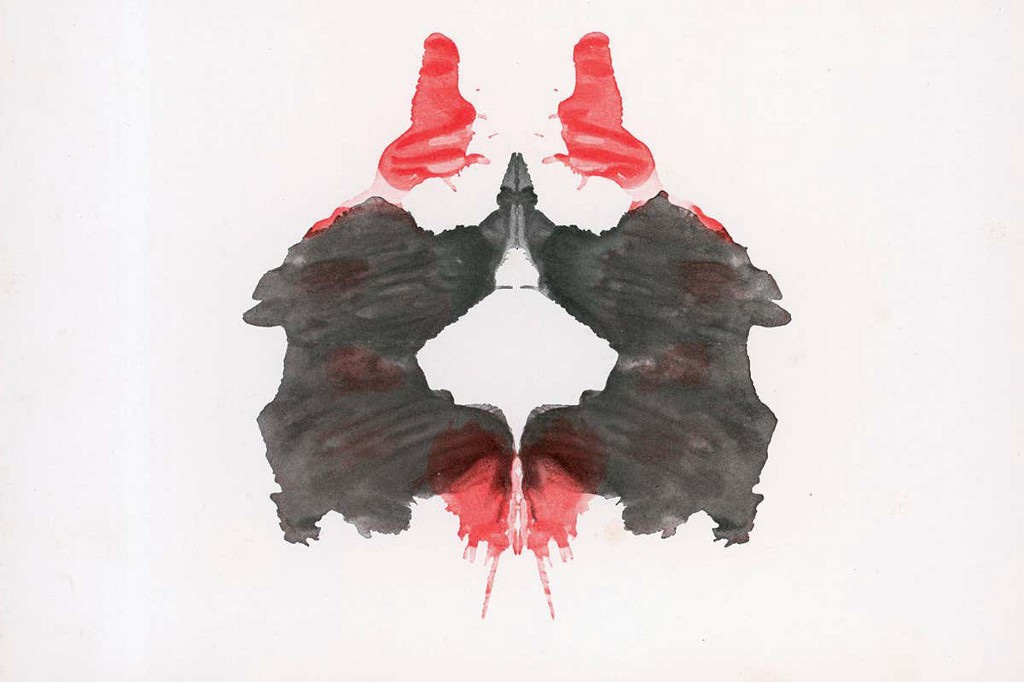
Biggest Tourney Winner: Give it up for Tyler Hinman, who won both the ACPT and the MIT Mystery Hunt’s special “fencing” tournament. Other tournaments: Boswords, Lollapuzzoola, Finger Lakes Crossword Competition. Most were online this year, but the ACPT plans to be back in person in 2022 (writeup here by Patrick Merrell). We’ll…see. The Indie 500 used its 2020 puzzles to fund nine charities, but its future is a bit uncertain, especially since the website was down last time I looked.
Biggest Crossword Streamers, by Platform: Katie Grogg (on TikTok from Twitch, and see Polygon’s report on CrosswordTok), Northernlion (on YouTube), Cursewords on Twitch (interview with Parker Higgins here).
<a href="https://medium.com/media/0e217457139645d4d4f2980fdc612df9/href">https://medium.com/media/0e217457139645d4d4f2980fdc612df9/href</a>
Most Famous Non-Streamer Solver: The Weeknd.
Most Famous Solver to People Who Don’t Know What a Streamer Is: Queen Elizabeth.
Best New Online Hub: Crossword Discord.
Biggest “Uh, We’re Not All Like THAT” Facepalm: Abcdef Ghijk, Adef to his friends, is a 12-year-old boy who supposedly owes his name to his father’s love of crosswords.
Best “WHOA I’M IN A CROSSWORD” Reaction: DC mayor Muriel Bowser, below.
Muriel Bowser on Twitter: "While I appreciate being included in a @nytimes crossword puzzle as 53 across, I'd prefer to be 51! 😂 #DCStatehoodNow #51stState pic.twitter.com/t7jUoGBbIJ / Twitter"
While I appreciate being included in a @nytimes crossword puzzle as 53 across, I'd prefer to be 51! 😂 #DCStatehoodNow #51stState pic.twitter.com/t7jUoGBbIJ
Crossword Proposal of the Year: Noam Kapah to Yael Sharabani, in Israel Hayom with constructor Ofir Shamir. She said yes! I see a story like this most years, but never before has the puzzle been in Hebrew.
$$$$: I’m retiring the “most profitable solve” category, because, well, tracking the stories of “Crossword” scratch game winners has gotten a little depressing. There was the unnamed immigrant who probably lost $750,000 in winnings because he couldn’t open a bank account and Tiffani Hill, a $2 million winner killed in a murder-suicide along with her young daughter…you don’t want to read about those in a roundup like this, do you? On the lighter side, Bryan Moss became a six-time scratch-game winner and crossword-maker Kristian House used his puzzling chops to win $10,000 in a treasure hunt.
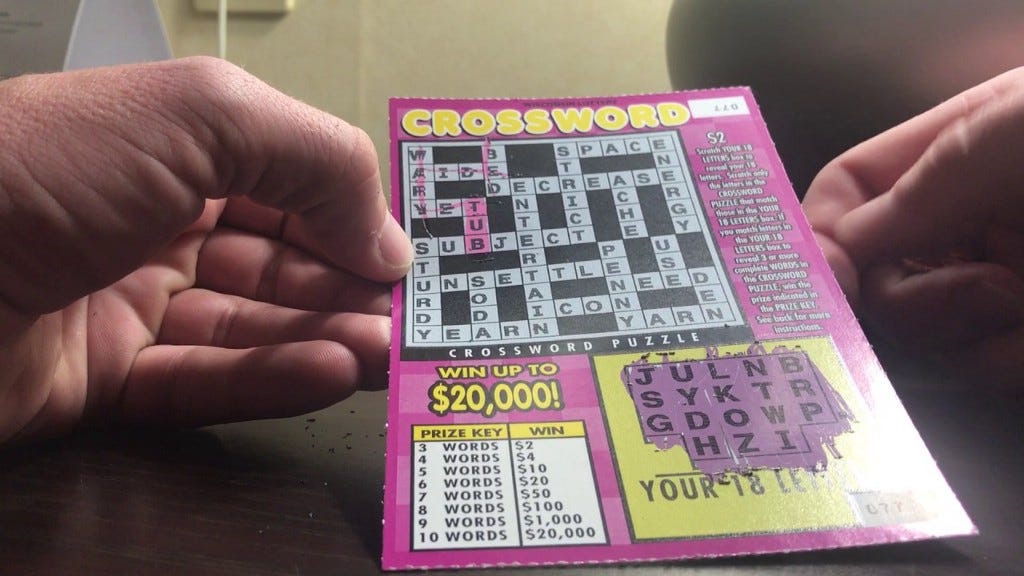
Crosswords in Media
Print: In addition to Letters to Margaret, 2021 saw the release of One Step Sideways and 13 Down, Lucy Burnett’s book of crossword-inspired poetry. Also, here’s Eleanor Booker’s “My Mother as a Crossword Puzzle” (page 1, page 2).
More into murder than meter? Try The Marlow Murder Club, a classic cosy mystery (and first in a series) with UK-based, crossword-setting, 77-year-old heroine Judith Potts.
Screen: And speaking of murder, puzzle editor Tess Harper found herself solving two more killings this year in Terminal Descent and Riddle Me Dead, the latest installments in the ongoing Crossword Mysteries. (Warning: may cause aneurysms in those who expect crossword-accuracy from their Hallmark movies.)
<a href="https://medium.com/media/63229bd51060e5b30b5e70a0130cc2f5/href">https://medium.com/media/63229bd51060e5b30b5e70a0130cc2f5/href</a><a href="https://medium.com/media/623a13fdd17828c666fbc4693d5a2c4b/href">https://medium.com/media/623a13fdd17828c666fbc4693d5a2c4b/href</a>
The PEOPLE Crossword has inspired the TV game show The PEOPLE Puzzler on GSN, with host Leah Remini. Newscast Studio explored the show’s aesthetic and confirmed it was a ratings win for the channel, further verified by its renewal for a second season.
<a href="https://medium.com/media/e9bbd0d1331365cbf5928bcaf0ce20bd/href">https://medium.com/media/e9bbd0d1331365cbf5928bcaf0ce20bd/href</a>
David Pedersen lost the Wheel of Fortune Crossword game on what many considered a tiny technicality. Then Sharon Bowers did the same. Fans got into an uproar, but that’s just how they show they care. They don’t like it when WoF ignores those technicalities, either. THEY JUST WANT PERFECTION, IS THAT SO MUCH TO ASK.
Gaming: New releases: #1 Crosswords for the Switch, Tiny Crossword+ and wurdweb for Apple Arcade (“basically Bananagrams which is basically Scrabble”). And if you’re looking for crossword games, this top ten list, despite some broken English, gets the job done.
Advertising: Gucci released a playful puzzle book and a short film in which Miley Cyrus does mushrooms amid giant crosswords… oh, sorry, I mean she does crosswords amid giant mushrooms, don’t know how I got that wrong. United used crosswords and other clues to hint obliquely at new route offerings. Also, why is advertising like a crossword? Ask John Cleese.
Miley Ray Cyrus on Twitter: "A short film directed by muahhhhh for #GucciAria @gucci 🍄 💕🦄🌈💋 pic.twitter.com/dEzPl0IpdJ / Twitter"
A short film directed by muahhhhh for #GucciAria @gucci 🍄 💕🦄🌈💋 pic.twitter.com/dEzPl0IpdJ
Crossword Podcasts: Crossnerds, Two Girls One Crossword, and Fill Me In (from the makers of Lollapuzzoola) didn’t technically launch this year, but I missed ’em earlier and they’re crossing my desk more often these days…
Theater: David Kwong’s “The Enigmatist” returned to a live stage. More here.
You can watch a live-recorded reading of the new play Esmeranda’s Gift (Or How to Make a Crossword Puzzle and Solve Your Life).
<a href="https://medium.com/media/d8456cf15366790422be4e00d556a860/href">https://medium.com/media/d8456cf15366790422be4e00d556a860/href</a>
Humor from Peter Grosz: “For 1 Across the clue was ‘Recent events.’ The answer, obviously, should be ‘Divorce,’ not ‘News,’ as was listed in your answer key. The news occurs every day, but Julia kicking me out just happened last week and is clearly on the top of everyone’s minds…”
Music: Maya Bon/Babehoven has released “Crossword” as part of the Nastavi, Calliope EP. Song here, review of both here.
Merch: Did you know you can buy a New Yorker crossword…that is also a jigsaw?
And if you like this sort of thing, you may like PuzzleNation’s roundups of crosswords as pop culture shorthand and as secret messages for fictional spies.
Subscriber Bait
Publications have been adding crossword features for a while, and that’s slowed down a bit, but the new trend seems to be offering ancillary content about crosswords that you’d need an article subscription to fully keep up with.
This is nothing new to the New York Times: it has Wordplay, now written by Rachel Fabi, Deb Amlen, and Caitlin Lovinger. Wordplay reviews each crossword and also offers essays and occasional “Solver Stories,” like this one by Mandy Shunnarah dedicated to her grandmother and this pandemic romance by Irene Jiang. Other highlights include a study of social solving and Adrienne Raphel’s argument for riddles as the ur-crossword puzzles. (If you’d like to submit to Wordplay, here’s a guide.)
Matt Gaffney’s Get a Clue series for The Daily Beast covers many of the intricacies of crossword construction, including “what happens when your mind plays tricks on you when cluing,” time to construct, various topics like Olympian athletes and famous cheeses, and how Wikipedia is “both a gift and a curse.” Gaffney also gave a radio interview here.
The Guardian published some knight’s-tour mini-crosswords and a few “lost” classics from its much-missed crossword-master, Araucaria, a meditation on the great sentence shortening, musings on the nature of letter banks and more from Alan Connor. (Though not technically requiring subscriptions, its desktop interface has been getting pushy about encouraging them.)
The Atlantic’s Caleb Madison launched what might be the next frontier of crossword subscription content, The Good Word, a regular newsletter.
Fun with Data
What gets left out of acrostics? Jim Horne and Jeff Chen investigated. They also determined the commonest clue in NYT puzzles (“See 17-Across”). Professor Allen Downey did an informal test of crossword letter frequency versus actual letter frequency (“too many Z’s, not enough W’s”) which clashes a bit with the wealth of data Handa gathered through 7xwords (report here).
Similes
Ross Trudeau on what climbing and crosswords have in common. Zach Buchanan on the pastime’s popularity with baseball players. May Huang on construction’s similarity to translation. David Murdock on why crosswords are like life. Steve Stannard on why they’re like research.
Odds and Ends
The pros and cons of speed-solving.
Maggie Krajewski uses a popular crossword clue search to Google-hack a little attention for Los Lunas in New Mexico.
Margaret McKie got a 100th birthday crossword in The Scotsman. Nola McKee, for her own centennial, just got a crossword cake, but it was made in the image of her beloved New Zealand Herald.
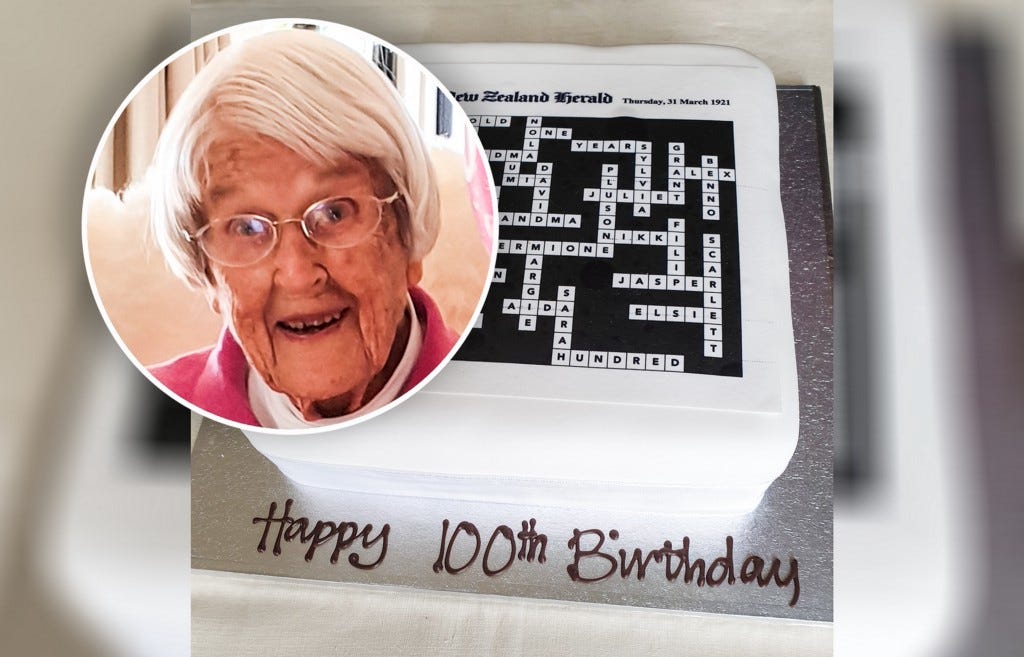
Ben Thier discussed his — and Duke University’s — experience with solving the NYT Mini.
How crossword puzzles help kids’ development.
FiveThirtyEight published an Elise Corbin puzzle with a more geometric bent than most (puzzle here, answer here).
Renee Loth admitted to a crush on Rex Parker.
Sting intimidated Steve Martin, Selena Gomez, and Martin Short with a cryptic solve.
John Halpern and Will Shortz threw a charity event on British and American cryptic construction. Halpern also teamed with comedian Dave Gorman and an audience to compile a crossword themed around the band Madness.
Book Riot’s Isabelle Popp caught us up on the sometimes-fraught history of the Scrabble Dictionary.
People
RIP: Nancy Salomon, prolific constructor and mentor (further memorialized here). Stephen Sondheim, the much-beloved musical director who largely introduced U.S. audiences to cryptic crosswords, as explored here and here. C.G. Rishikesh, AKA “Gridman,” beloved cryptic setter for The Hindu in India. Anne Bradford, author of a well-loved Crossword Solver’s Dictionary. Maki Kaji, the creator of Sudoku.
Constructor Profiles: Peter Wentz, Sid Sivakumar and Matthew Stock, Simon Evans, Joel Fagliano (mini-crossworder for the NYT), Soleil Saint-Cyr (youngest girl/woman published in the NYT), George Euvrard, May Huang and Kevin Trickey, Lisa Bunker, Adam Levine, John Halpern, Caitlin Reid, Simon Marotte, Tap van Geel, Donald Harrison (DH), Chez Knox,, Andy Kravis, Nathan Hasegawa, Adrian Johnson, John Guzzetta, Hectence, Brendan Emmett Quigley, Leonard Williams (anarchist professor, audio interview), Mollie Cowger, Rachel Fabi, Mangesh Ghogre, Phi, Soup, Carpathian, Anto, Dave Gorman, Erica Wojcik, Tees, Tramp, Olivia Mitra Framke, Will Nediger, Vic Fleming, Sheldon Polonsky, Jeff Chen, Johanna Fenimore, Dave Bradshaw, Adam Wagner, Aimee Lucido, Kate Hawkins, and Rich Proulx, Yacob Yonas, and…Will Shortz.
Scholarly Works
Multigraphs from crossword puzzle grid designs. By Ben Coté and Leanne Merrill. Research on that “how many real crossword grids can you get at different sizes” question that led to the 7xwords project. (Note, though, that both this study and 7xwords are assuming rotational symmetry, which USA Today is proving doesn’t have to be a requirement.)
Cryptonite: A Cryptic Crossword Benchmark for Extreme Ambiguity in Language. By Avia Efrat, Uri Shaham, Dan Kilman, and Omer Levy. If you’re a bit threatened by that Dr. Fill win, you may take heart in knowing that Cryptonite, these researchers’ cryptic-solving program, is currently solving with about 7.6% accuracy.
A Multi-Strategy Approach to Crossword Clue Answer Retrieval and Ranking. By Andrea Zugarini and Marco Ernandes. On the other hand, if Dr. Fill has you intrigued, here’s some work being done on the answering of non-cryptic clues that builds on Ginsberg’s among others.
Crossword Twitter Highlights
Limit: one tweet per author, mostly to keep Evan Birnholz, Malaika Handa, and Ross Trudeau from dominating the year…
Tim Urban on Twitter: "Me doing a crossword puzzle pic.twitter.com/7tJ96sV1ki / Twitter"
Me doing a crossword puzzle pic.twitter.com/7tJ96sV1ki
Ross Trudeau on Twitter: "I can't find an instance of EEP appearing in a major daily crossword, and now I'm on a personal crusade 😘 pic.twitter.com/2WXsZkucHc / Twitter"
I can't find an instance of EEP appearing in a major daily crossword, and now I'm on a personal crusade 😘 pic.twitter.com/2WXsZkucHc
sanj ✿ ♡ on Twitter: "when the nyt crossword is difficult for me it is american intellectual hegemony. when the nyt crossword is easy for me i am a polymath legend / Twitter"
when the nyt crossword is difficult for me it is american intellectual hegemony. when the nyt crossword is easy for me i am a polymath legend
rafa on Twitter: "poorly our crumblingconstructed electricalcrossword infrastructure 🤝 "we should rethink this grid" / Twitter"
poorly our crumblingconstructed electricalcrossword infrastructure 🤝 "we should rethink this grid"
Paul on Twitter: "My 5yo daughter completed her first NYT crossword!!! "I helped you," she told me. pic.twitter.com/2xZ9bzWEaa / Twitter"
My 5yo daughter completed her first NYT crossword!!! "I helped you," she told me. pic.twitter.com/2xZ9bzWEaa
Mike on Twitter: "Promoted Tweet Topics: Cruciverbalist EditionSolve Crosswords Quickly Using This One Weird Trick30 Times ETUI Appeared in a Puzzle - You Won't Believe #17!They Had Planned the Perfect Wedding, But Then She Saw This Grid / Twitter"
Promoted Tweet Topics: Cruciverbalist EditionSolve Crosswords Quickly Using This One Weird Trick30 Times ETUI Appeared in a Puzzle - You Won't Believe #17!They Had Planned the Perfect Wedding, But Then She Saw This Grid
McGrids on Twitter: "Crossword Construction Bucket List:□ Every square is a rebus□ Panda grid art□ Intersecting nonuple stacks□ Collab with my sister's cat Cookie Dough□ A naughty little step quote□ KenKen What are yours? /s / Twitter"
Crossword Construction Bucket List:□ Every square is a rebus□ Panda grid art□ Intersecting nonuple stacks□ Collab with my sister's cat Cookie Dough□ A naughty little step quote□ KenKen What are yours? /s
malaika "7x7 overlord" handa on Twitter: "how do i explain to every boy i go on a d*te with that i am much better than him at crosswords but in, like, the grand scheme of The Crossworld, i'm actually not that good at crosswords / Twitter"
how do i explain to every boy i go on a d*te with that i am much better than him at crosswords but in, like, the grand scheme of The Crossworld, i'm actually not that good at crosswords
kateschmate on Twitter: "all my time lately (other than work) has gone to moving and crosswords. completely dropped the ball on wedding stuff. at this rate my vows are gonna be like [Declaration of dependence? (3)] / Twitter"
all my time lately (other than work) has gone to moving and crosswords. completely dropped the ball on wedding stuff. at this rate my vows are gonna be like [Declaration of dependence? (3)]
joey alison sayers on Twitter: "Don't embarrass yourself at the Crossword Convention: the word "crossword" is pronounced "crow's sword" / Twitter"
Don't embarrass yourself at the Crossword Convention: the word "crossword" is pronounced "crow's sword"
joe heenan on Twitter: "That time I completed a crossword in under 10 minutes pic.twitter.com/FC4HckeDYX / Twitter"
That time I completed a crossword in under 10 minutes pic.twitter.com/FC4HckeDYX
Matt Gritzmacher on Twitter: "If a beer is called "Monday Crossword" do I have to drink it in 1:56? pic.twitter.com/QfsIS5MF6E / Twitter"
If a beer is called "Monday Crossword" do I have to drink it in 1:56? pic.twitter.com/QfsIS5MF6E
Francis Heaney on Twitter: ""One down." https://t.co/CA9sDqMwmS / Twitter"
"One down." https://t.co/CA9sDqMwmS
Evan Birnholz on Twitter: "Twitter, it's my fault. Here was a clue I wrote for 92D in the May 27, 2018 Washington Post Magazine crossword. pic.twitter.com/gXbcJOaIBN / Twitter"
Twitter, it's my fault. Here was a clue I wrote for 92D in the May 27, 2018 Washington Post Magazine crossword. pic.twitter.com/gXbcJOaIBN
meghan on Twitter: "Tried half an edible once and spent a long time thinking about whether the vertical words in a crossword hate the horizontal ones, so yeah, I party / Twitter"
Tried half an edible once and spent a long time thinking about whether the vertical words in a crossword hate the horizontal ones, so yeah, I party
Dan Slott on Twitter: "For Batman, fighting the Riddler is like what doing the NYT crossword puzzle is for the rest of us. / Twitter"
For Batman, fighting the Riddler is like what doing the NYT crossword puzzle is for the rest of us.
Byron Walden on Twitter: "OK, which crossword constructor made this happen? pic.twitter.com/cPrMLHMpBx / Twitter"
OK, which crossword constructor made this happen? pic.twitter.com/cPrMLHMpBx
Beyond Wordplay on Twitter: "A timely little crossword that our own @bgzimmer created while watching that peculiar Oscars broadcast. pic.twitter.com/LsKzgvfTpG / Twitter"
A timely little crossword that our own @bgzimmer created while watching that peculiar Oscars broadcast. pic.twitter.com/LsKzgvfTpG
Amanda Rafkin on Twitter: "One of my favorite things about making crossword puzzles is that the process of googling a trillion random things for clues consistently keeps "the algorithm" off my scent. 🕵️♀️ / Twitter"
One of my favorite things about making crossword puzzles is that the process of googling a trillion random things for clues consistently keeps "the algorithm" off my scent. 🕵️♀️
𝕒𝕟𝕟𝕒 on Twitter: "my roommate just bought us a new microwave and I didn't know the crossword guy had a side hustle pic.twitter.com/opKjFiNRSb / Twitter"
my roommate just bought us a new microwave and I didn't know the crossword guy had a side hustle pic.twitter.com/opKjFiNRSb
Schadenfreude
Bafflingest New Venue: Drew Barrymore launched a magazine called DREW, with “beauty and food, human interest and travel (and a crossword puzzle yay!)” Seems…kind of superfluous to the market, and even though she has a successful talk show, “things that Drew Barrymore is interested in” is a strange theme to structure a periodical around. It worked for Oprah, I guess?
Most Controversial Entry of the Year: It’s pretty hard to top Le Plateau with “Person of the Black race (pl.)” and the answer N*****S. On top of the obvious horribleness…who the hell still writes clues with “(pl.)” for “pluralize the answer,” anyway? Just pluralize the clue!
There was also a complaint about The Portland Press-Herald’s December 19 clue/answer, “Actress Page/ELLEN.” In December 2020, Page came out as “Actor Page/ELLIOT.” As the complainant recognized, this was likely to be a case of an old puzzle being run after over a year’s delay, not an intentional deadnaming. Although this does raise questions about the widespread practice of leaving such puzzles in inventory in a changing world. One could have written “Universally beloved talk-show fixture DeGeneres,” and that would have gone out of date in 2020, too.
Worst Puzzle Feature of the Year: Tough call as usual. I mean, I could just mention the insurrection-enabling Fox News has one now and call it a day (hat tip: Ross Trudeau). For awful constructor relations, there’s also the Morning Brew, a newsletter with a 2.4 million circulation that pays its accepted contributors in sweatshirts (hat tip: Amy Reynaldo).
But even though it wasn’t exactly a crossword, I have to single out Typeshift, the word-combination-finding game promoted by Merriam-Webster. This looked like an exciting new lexical game a la Wordle at first, then ended up setting some kind of record for offensiveness… yeah, it was even worse than that Le Plateau entry, overall.
The whole app is now just a bad memory, but a cautionary one…and it casts the aforementioned effort to center minorities at the NYT and USA Today in a new light. Whether through ignorance or malice, old prejudices are going to find expression in any widely accessible space. It’s worth supporting those who take the time to counter them.



